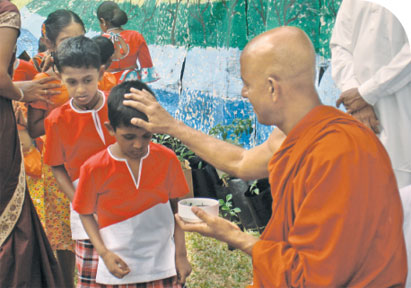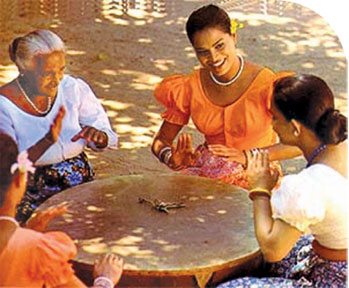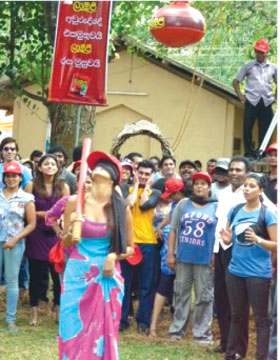Let national unity be the theme for the New Year
By Lionel WIJESIRI
In a few days when the sun moves from the Meena Rashiya (House of
Pisces) to the Mesha Rashiya (House of Aries) in the celestial sphere,
Sri Lankan Sinhalese and Tamils together will begin celebrating their
Aluth Avurudu and Puththandu. The anthropological history of our
'Traditional New Year' goes back to an ancient period in Sri Lankan
history.
 |
|
Anointing of oil at the
auspicious time |
Scholars tell us that the Sinhala-Tamil New Year has come about in
the form of harvesting thanksgiving. In time, this celebration has
developed into a national event of significant social, cultural and
religious features unique to Sri Lankan life.
Although there are some slight differences in their customs and
traditions, the Sinhalese and Tamils celebrate the same New Year and
find amity in their beliefs.
This clearly demonstrates the deep-rooted common bond and cultural
heritage between them.
Let us take few events in the celebrations. When the predetermined
time for the preparation of the ceremonial meal comes, someone, usually
the matriarch, dressed up in lucky colour and facing the auspicious
direction, starts the fire to begin cooking the first meal of the New
Year, usually Kiribath (Milk rice) in the Sinhalese tradition, and
Pongal in the Tamil tradition.
After cooking Kiribath or pongal, the whole family sits for the first
meal of the New Year. Before eating, however, Buddhists normally make a
special offering to the Buddha, and the Hindus to birds and animals.
Tradition
After the meal, comes the auspicious time for Business Transaction.
It is called Ganudenu in Sinhalese, meaning receiving and giving. Most
commonly, people exchange coins wrapped in betel leaves, usually the
always lucky young getting more money than what they give.
In the Tamil tradition, the head of the family or another prominent
member distributes money to others. This tradition is called kaivisesam
in Tamil. Tamils believe that if they receive money from an elder it
will bring them luck. Thereafter comes the auspicious time for
initiating work. The farmer plants a tree. The student reads a book or
does a math problem. Small children do their first time reading and
writing too at this time. The two or three days that follow, mark the
most joyous merry making time of the year. The entire country, both
Sinhala and Tamil, participates in one big celebration.
At the end there is a special way to end the festival. In the
Sinhalese tradition, the eldest member of the family prepares special
herbal oil and anoints the rest of the family members.
In the Tamil tradition, a similar event takes place with holy ash,
sandalwood paste, and kumkumam. People decorate their foreheads with
three lines of holy ash and a beautiful pottu in the centre, after a
special puja in their shrines.
Harmony
Let us now move a step further and dedicate this New Year to ensuring
the growth and stability of racial harmony.
 |
|
Raban players in action |
Healing the wounds and building a society in which people of diverse
backgrounds live as members of one family are the most pressing issues
confronting Sri Lanka today. Our peace, our prosperity, and even our
standing in the international community depend on the resolution of
these issues.
The responsibility for the achievement of peace and unity Sri Lanka
rests upon us. To build a society in which the rights of all its members
are respected and guaranteed, we must be animated with the spirit of
optimism and faith in the eventual realisation of their highest
aspirations. We must recognise that unity is essential for our survival.
Youth
We must recognise that there is only one nation - Sri Lankan nation.
We must recognise that a harmoniously functioning society that permits
the full expression of the potential of all persons can resolve the
social and economic problems now confounding our society.
Children and young people are perhaps the key to realising true
national unity. Young people are the first to adapt new technologies,
the first to consider new possibilities, new ways of thinking.
Young people tend to ignore superficial differences, and make friends
with people from all strata of society - a key component to building
unity and national understanding.
Children should be allowed to mix with all races and religion - this
should not be a matter of choice but a must.
By growing up and studying in such an environment, our children will
grow up to eventually disregard the differences among them.
They would understand each other's culture well and learn to respect
them as well.
They would then grow up in a healthy mindset.
At school, all students must learn all three languages - Sinhala,
Tamil and English. President Mahinda Rajapaksa's Tri-lingual Education
Policy is a good starting point.
In the not-too-distant future, when each citizen in Sri Lanka knows
all languages used in the country, there will be free communication
between the various races in Sri Lanka.
When they are communicating between each other, they become friends.
When they become friends, they may start to know and respect each other.
When they respect each other, there will be ultimate unity among Sri
Lankans. This is a reconciliation cycle found to be successful in many
countries with multi-racial population.
 |
|
A scene from a New Year
celebrations |
The public of Sri Lanka has always been united and though incidents
of the past may be used to show dissent. Sinhalese, Tamils, Muslims and
all other ethnic groups living in Sri Lanka have good relationships with
one another and with the movement of people there are new ties emerging.
If everyone starts doing their part in the nation building exercise
Sri Lanka will never have to fear falling prey to any external force.
Nevertheless, the present scenario calls for all individuals and groups
to unite to ensure that our nation does not become a target of another
western game plan.
The only way we can do that is if we come together to create a force
to be reckoned with. Under one banner of unity, we can be together -
Sinhalese, Tamils and Muslims - and unite for a united Sri Lanka.
Resolution
So for the sake of our future generation, in the eve of this year's
Aluth Avurudda, let all of us have a singular resolution: to walk that
extra mile towards the next stage of an authentic reconciliation -
addressing the issues that stand in the way towards a united Sri Lanka.
No great idea or plan of action by the Government or other interested
organisations can hope to succeed if the individual neglects to respond
in his or her own way as personal circumstances and opportunities
permit.
Therefore, let us call upon our fellow Sri Lankans of whatever
background to look at the present situation with new eyes and with a new
determination to lend effective support to the resolution of a problem
that hinders the advance of this great country toward the full
realisation of its glorious place in the world.
|

